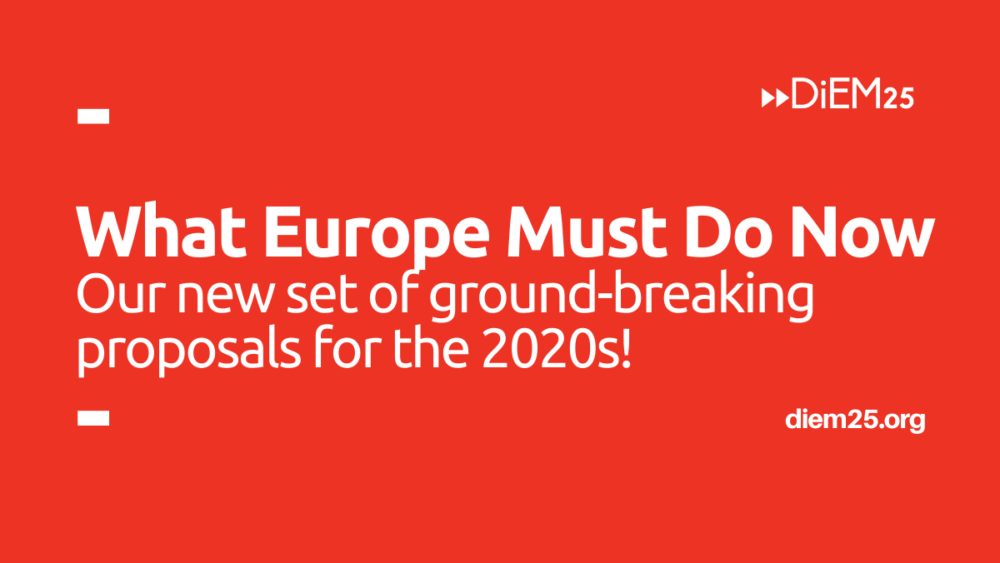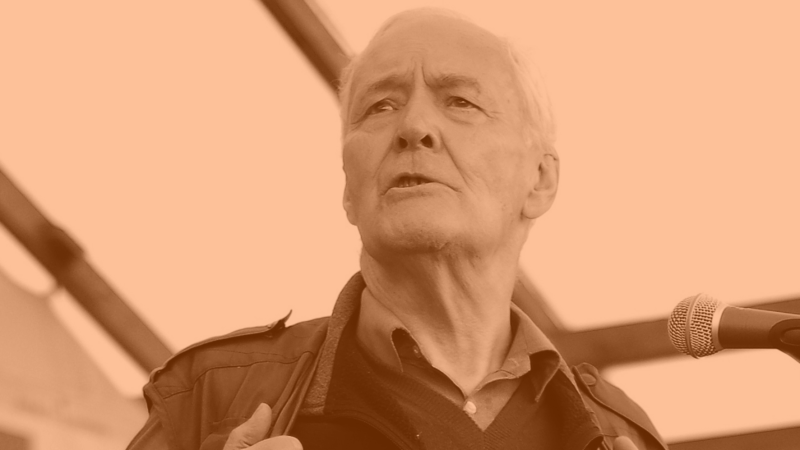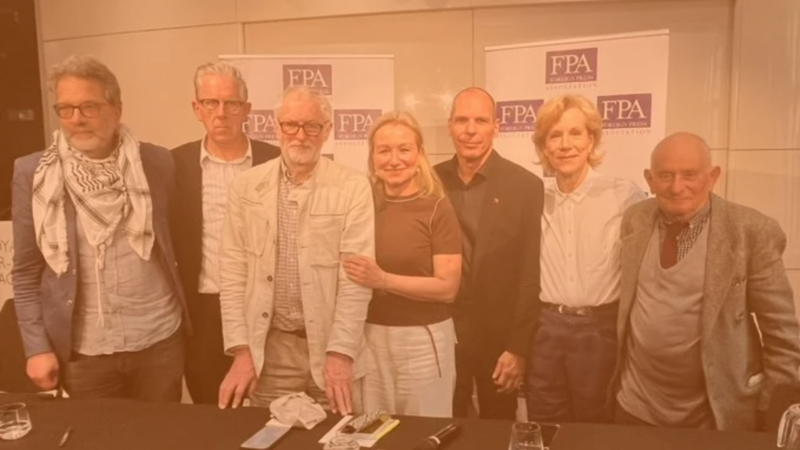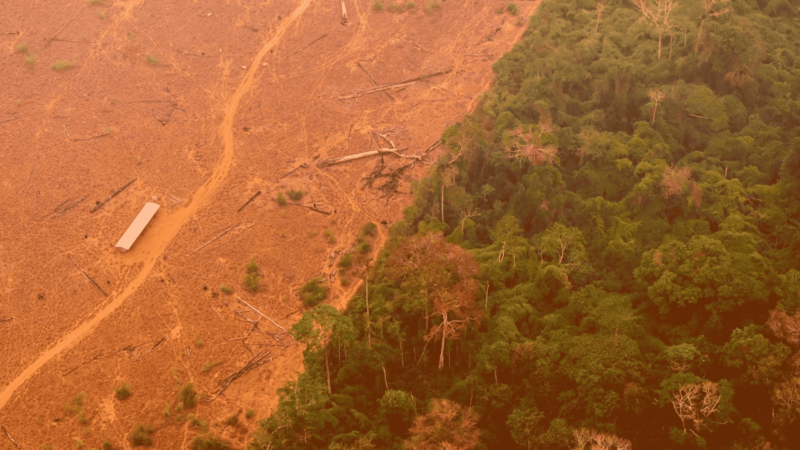DiEM25 members have voted in a set of ground-breaking proposals on “What Europe Must Do Now”: our policy for Europe’s 2020s.
It’s been half a decade since DiEM25 was launched to fight Europe’s slide into authoritarianism and renew the European project with a new ambitious purpose: democratisation!
Since then, the political landscape has changed, and we have done our best to remain relevant. This culminated in the vote for “What Europe Must Do Now”: our list of key, priority policies for Europe’s 2020s.
Check out the paper below that DiEM25 members approved in the All-Member-Vote that closed this morning.
What Europe Must Do Now
DiEM25’s Progressive European Policy Agenda for the 2020s
1. Introduction
Covid-19 has unveiled the EU’s lack of institutions that can address a public health crisis. It has also confirmed that the EU continues to lack the institutions necessary to reduce the economic imbalances which undermine the Union, suppress investment and cause preventable economic failures that undercut the life prospects of the majority of Europeans and those residing in Europe. Lastly, the EU has failed to make Europe safer. By refusing to terminate its reliance on fossil fuels, as well as on nuclear weapons for strategic purposes, the EU has reinforced geopolitical tensions, especially in the Eastern Mediterranean.
At the same time, under the guise of a pandemic, the conservatism of Europe intensified and many individual, social and labor rights were violated. In this Europe, which is experiencing the instrumentalization of the pandemic, its peoples are called with the tool of transnational solidarity, to protect the achievements of past struggles but also to build the new, post-capitalist model of production, work and life. We call on us to support public goods, to fight for an open and peaceful Europe and to protect the European human rights acquis based on the Convention for the Protection of Human Rights and Fundamental Freedoms.
The EU’s pandemic management makes it clear that a multi-speed Europe, operating in a competitive environment with private-sector criteria and class discrimination, will not be able to cope with future crises. There is a need for a unified European policy with a social, solidarity-based and progressive bent.
DiEM25 is now proposing a Progressive Agenda focusing on PUBLIC HEALTH, SHARED PROSPERITY, and SUSTAINABLE PEACE. Our Agenda comprises policies drawn from DiEM25’s comprehensive Green New Deal for Europe as well as policy initiatives honed at the outset of the 2020 pandemic.
2. Public Health, Shared Prosperity & Sustainable Peace
2.1 Public Health
European public health can no longer remain within the ‘competence’ of nation-states. The pandemic demonstrated that, unless the EU provides basic health services (e.g. vaccines) to all its citizens equally and effectively, the Union is unsafe – some would say pointless.
The pandemic demonstrated that the EU must guarantee its citizens and all those residing in the EU equal access to facilities that provide free testing, free vaccines and free primary care. Basic goods (e.g. test kits, vaccines, protective equipment) must be procured centrally and production must be distributed among the various countries to avoid distribution problems in case of logistical blockages; sizable stocks must be in place everywhere within a well-functioning public health systems and networks. On top of this, focusing on the improvement of basic health and well-being infrastructures and facilities such as: (1) access to clean water and sanitation; (2) effective public sewage systems; (3) clean air; (4) healthy and secure housing; (5) food security; (6) access to mental health services;
Mindful of Europe’s duty to non-European countries in its neighbourhood and beyond, the EU must also donate such basic public health goods and infrastructures internationally to all countries far and wide. E.g. In the case of vaccines, DiEM25’s position is that a rich Europe has an obligation for every vaccine it provides within the EU to have one vaccine distributed internationally or in neighbouring countries. All these basic health goods, both internally and externally, will be financed using the European Central Bank’s lending facility, rather than tight government budgets.
The pandemic has led to a massive increase in economic, health and political inequality on a previously unimaginable scale. It has established unprecedented government control over the populace facilitating growing authoritarian tendencies that are ever more apparent, even in mature democracies. It has favoured capital over labour, enriching by trillions of dollars the wealthiest 1% while destroying millions of jobs and smaller enterprises. It has enlarged the gulf between managerial, intellectual and clerical work, which has been quickly moved online, and frontline and manual workers that have been left exposed to the virus. It has disproportionately hit ethnic minorities and the poorest communities and this pattern of inequality will only be made worse by a global distribution of vaccines that massively favours wealthier nations.
To start reversing this trend of increasing inequality, it’s necessary to put a definite end to the pandemic itself in the shortest possible time on a global scale. The restoration of local public health systems, with a capacity to find, track, trace, isolate and support to isolate is crucial for the successful suppression of pandemics.
Furthermore, DiEM25 demands a massive decrease of high-density factory farming of animal livestock, which is known to increase the likelihood of new zoological pandemics. Simultaneously this will help reaching the goals set to prevent worsening the climate crisis due to the large ecological impact of factory farming.
In the interest of civil liberties and to ensure its citizens the basic privacy rights that Europeans have earned the hard way over centuries of struggles, in times of health emergencies, like the present one, the EU must tread carefully. DiEM25 supports digital technologies which can facilitate an effective track and trace system during a pandemic while safeguarding anonymity. With the exception of specific occupations and workplaces (eg hospitals, nursing homes) where vaccination may be required, DiEM25 supports the development of digital applications that help demonstrate negative tests (eg on Covid-19) as a condition for free movement but not vaccination “passports” that, if introduced, will open the Pandora’s box of privacy breaches by insurance companies, employers and government agencies. In conclusion, DiEM25, despite the fact that it considers vaccines a public good of the highest value, opposes any vaccination “passport” but not digital applications aimed at the temporary certification of negative tests.
2.2 Shared Prosperity
During the recent intensification of the global capitalist economic crisis due to Covid-19, the Eurozone suffered the largest decline in investment (50%), the largest flight of capital (€500 billion) and the largest increase in the “output gap” (i.e. the difference between the total product we could produce and that produced) relative to the US, China and the UK. Moreover, intra-European imbalances (which had already grown before and after the euro crisis) increased exponentially. However, the EU has administered the smallest fiscal stimulus in the strongest economic regions of the world and done the least to boost investment – relying almost exclusively on the so-called Recovery Fund, which is both macroeconomically insignificant and politically poisonous. As a result, the 2020s are projected to be Europe’s second lost decade in a row.
To prevent this, and to give shared European prosperity a chance, DiEM25 has proposed – and is doing so again – five policies:
- ECB-Bonds to lessen the strain on member-state budgets: All primary budget deficits since March 2020 to be financed by means of 30-year bonds issued by the ECB (ECB-bonds). The 30-year-long maturity of the ECB-bonds, to be invested primarily in the public sector, will function as an added incentive for Europe to emerge within three decades. Such a duration essentially gives Europe a deadline three decades to move forward in a democratic political union.
- ECB Bonds to be exchanged for previous (pre-pandemic) bonds with a view to restructuring old debts: Now is the time for public debt of countries that were essentially bankrupt (eg Greece, Italy) before the pandemic to be restructured through debt swaps of national bonds with ECB Eurobonds.
- Solidarity Cash Payments: The ECB initially credits € 2000 to each resident’s main bank account. These payments can be repeated depending on the evolution of active demand, investment and economic activity.
- European Green Recovery & Investment Program: The European Council should give the green light to the European Investment Bank to issue annual bonds of 5% of EU GDP, which the ECB says it will “support” in secondary bond markets. These funds finance a new European institution, the European Green Transition Works Agency whose main purpose is to create the European Green Energy Union and the elaboration of the EU’s Green Transition in general.
- Rescinding all Memorandum commitments: The Eurozone countries most affected by the economic pandemic “happen to be” those that were already irreparably affected by the Euro Crisis – the countries that the Troika “visited” after 2010 and imposed on them disastrous austerity and looting policies that, of course, did not apply in other countries. DiEM25 demands the immediate abolition of all these obligations, which ultimately affect the whole of Europe.
2.3 Sustainable Peace in Europe’s neighbourhood
In 2020 the EU officially endorsed a so-called ‘Green Deal’. Regrettably, it was endorsed “more in the breach than in the observance”: No real funding was ever put aside for this ‘Green Deal’ and, worse still, the EU continues to pursue the extraction and distribution of fossil fuels in a manner that increases geopolitical tensions.
In particular, plans to extract oil and gas in the Aegean Sea and the Eastern Mediterranean are causing geopolitical tensions that only benefit arms dealers and the financial vultures who profit from ‘securitising’ fossil fuels and gas pipelines and that will, most probably, not even see the light of day. They also fuel the pre-existing migration crisis by turning Turkey against the EU and vice versa.
The geopolitical tensions caused by the cynical hypocritical “Green Deal” of the EU are not limited to its southeastern borders. They are expanding to the northeast, where, for example, Germany and Russia are moving along the Nordstream2 pipeline, fostering dark business interests that boost both EU intra-European and international tensions, increase the likelihood of military conflict and, in addition to environmental damage, costs to the people of the region.
For Peace’s sake, and for the sake of European security and sovereignty, this must end. Rising tensions in the east of the EU make the approach and revival of the anti-war front politically and movement-wise a mandatory necessity.
In order to secure the future of the coming generations, DiEM25 calls on all states in Europe to join the UN Treaty on the Prohibition of Nuclear Weapons. We call on the EU to support Ukraine in achieving lasting peace with all its neighbours. Enforce the Minsk Agreement also in Ukraine itself.
DiEM25 proposes a new European Initiative for Sustainable Peace and Shared Prosperity.
For the situation in the northeast, DiEM25 proposes the immediate abandonment / abolition of the Nordstream2 pipeline and its replacement within the European Green Energy Network.
For the situation in the south and southeast, DiEM25 proposes the convergence by the EU of an International Conference on Peace & Green Energy in the Mediterranean. The proposal is for representatives of all Mediterranean countries to sit around the same table in order to agree that:
- 2.3.1 The Mediterranean is “liberated” from fossil fuels (ie no mining, no new pipeline) and is connected to the European Green Energy Network which will be financed mainly by the EU through the European Green Recovery and Investment Program (see 2.2.4)
- 2.3.2 they will mark on the same map of each country the requirements regarding the sea borders (ie, continental shelf and EEZ)
- 2.3.3 they will take this map, together, to the International Court of Justice in The Hague having accepted in advance its decision on the final demarcation of the maritime borders
3. Summary
The EU will either unify to confront the prospect of a second, consecutive lost decade, or it will perish. DiEM25’s Progressive European Policy Agenda for the 2020s offers the only path toward unification. The three sets of policies proposed by the first unified pan-European movement are absolutely consistent with the letter of the EU Treaties. Their implementation will bring together:
- protection of public health throughout the European continent
- solidarity with neighbouring and all other countries, which is not only a moral duty for Europe to do but also the only effective measure against pandemics that do not respect borders
- elaboration and financing of the Green Transition without which both society and the Planet will decline
- Adoption of public funding tools for the benefit of many – tools currently widely used for the benefit of the very few.
Only DiEM25’s Progressive European Policy Agenda for the 2020s offers Europe a chance to become a genuine, democratic Union. All other alternatives lead to its disintegration.
Appendix – DiEM25’s post-Pandemic Progressive Policy Agenda in bullets
-
PUBLIC HEALTH
- The provision of basic health goods and care becomes an EU duty
- A new EU Network of Public Primary Health Care Centres easily accessible to every EU citizen and resident offering:
- free testing on demand
- free vaccinations on demand
- general practice care free at the point of delivery
- Centralised procurement for:
- test kits
- vaccines, including the purchase of patents so as to facilitate local production
- basic medicines
- protective equipment
- The EU commits to providing internationally to countries most in need, free of charge, on a 1-on-1 basis, with all of the above essential health goods (see 1.2.1, 1.2.2. & 1.2.3) available within Europe
- Direct funding of 1.2 , 1.3 & 1.4 above utilising ECB instruments. In particular, the EU pays the companies that dispose of these goods through zero coupon perpetual bonds issued by the companies and bought by the ECB
- Vaccination passports and/or certificates are banned, to protect basic privacy rights. Instead, the EU funds the development of applications (apps) that enable an efficient track-and-trace system, securing anonymity and using open source software, to be incorporated in the EU network of public primary health care units mentioned in 1.2 above.
- Europe strongly reduces large-scale factory farming to minimise risks of new pandemics and to enable reaching climate goals.
-
SHARED PROSPERITY
- ECB-Bonds to lessen the strain on member-state budgets: All primary budget deficits since March 2020 to be financed through ECB 30-year bonds. Such a duration effectively gives Europe a three-decade deadline to move towards a democratic political union.
- ECB Bonds to be exchanged for previous (pre-pandemic) bonds to restructure old debts: Now is the time for sovereign debt of countries that were essentially bankrupt (eg Greece, Italy) and before the pandemic to be restructured through exchanges of national bonds with ECB Eurobonds (debt swaps).
- Pan-European Solidarity Direct Payments: The ECB initially credits € 2000 to each resident’s main bank account. These payments can be repeated depending on the evolution of active demand, investment and economic activity.
- European Green Recovery & Investment Program: The European Council should give the green light to the European Investment Bank to issue annual bonds of 5% of EU GDP, which the ECB says it will “support” in secondary bond markets. These funds finance a new European institution, the European Green Transition Works Agency, whose main purpose is to create the European Green Energy Union and to draw up the European Green Transition in general.
- European Green Recovery and Investment Program: Abolition of all memorandum commitments: The eurozone countries hardest hit by the economic pandemic “happen to be” those already hit hard by the Euro crisis – the countries that, after 2010, the troika was “visited” by imposing catastrophic austerity and looting policies which, of course, did not apply in other countries. DiEM25 demands the immediate abolition of all these commitments, which ultimately affect the whole of Europe.
-
SUSTAINABLE PEACE
- Immediate abandonment / abolition of the Nordstream2 pipeline and its replacement within the European Green Energy Union.
- International Conference on Peace & Green Energy in the Mediterranean. The proposal is for representatives of all Mediterranean countries to sit around the same table in order to agree that:
- The Mediterranean is “liberated” from fossil fuels (ie no extraction, no new pipeline) and is connected to the European Green Energy Network which will be financed mainly by the EU through the European Green Recovery and Investment Program (see 2.2.4).
- they will mark on the same map of each country the requirements regarding the sea borders (ie, continental shelf and EEZ)
- they will take this map, together, to the International Court of Justice in The Hague having accepted in advance its decision on the final demarcation of the maritime borders
Do you want to be informed of DiEM25's actions? Sign up here















